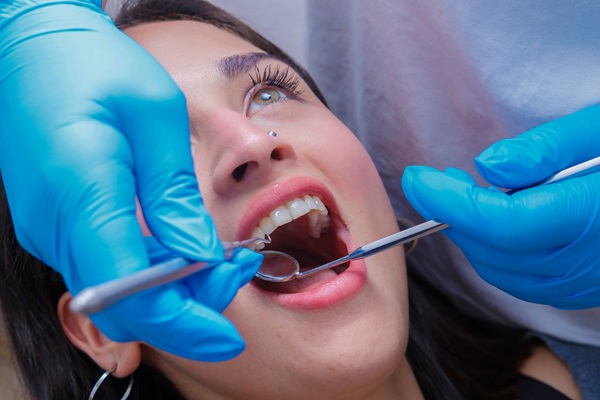Types of Floss and Tips for Flossing: Available Options

The different types of floss and tips for flossing make it possible to keep the tight spaces between teeth free of food particles and plaque. That goes a long way when it comes to fighting tooth decay. Dental floss is used to remove the plaque, food particles and bacteria that become lodged between teeth after meals. While some of this debris will be eventually washed away by saliva, the rest can be lodged between teeth.
Keeping the spaces between teeth keeps gum disease and tooth decay away. Those who fail to floss daily remain vulnerable to common oral diseases even if they brush their teeth twice a day. The bristles of a toothbrush simply cannot reach the tight spaces between teeth. Fortunately, there are different types of floss and tips for flossing that make it possible to keep these areas clean.
What dental floss is made from
Dental floss has been used as far back as the 1800s. It was often made out of silk back then, but modern floss is typically made from plastics that are liquefied and stretched into thin strands. These plastic floss materials are much stronger than silk or other textiles. Other materials like flavoring and wax are often added to make flossing a more pleasant affair.
Different types of floss and tips for flossing
1. Standard floss
This is the common type of floss that comes to mind when the topic comes up. However, there is lots of variety. Some are waxed or flavored with mint to increase their appeal. While it is normal to be fixated on the type of floss one decides to use, what really matters is the flossing technique used.
There is a noteworthy difference when it comes to waxed or un-waxed floss, though. The former slides through tight spaces much easier.
2. Floss picks
Floss picks are arguably the most convenient way to floss. The handle holds the floss for the person, so only one hand is required to floss. Having the floss held in place by the handle also makes it easier to floss the back of the mouth.
However, floss picks are not as effective as regular floss. It does not fully form a "C" enclosing the tooth, so it does not scape its surfaces as effectively.
3. Oral irrigators
Also known as dental water jets, oral irrigators are flossing tools that use a high-pressure stream of water to remove food particles and plaque between teeth. It also helps to improve the health of the user's gums. Oral irrigators are easy devices to use as well. The user simply puts it in their mouth, and the device does the rest. It is best to close the lips once the machine is inserted to prevent water from splashing out while it cleans.
Contact one of our dentists to learn more about the different types of floss and learn flossing tips.
Let's get started …
For more information or to schedule an appointment with Family & Cosmetic Dental Design, request an appointment in our Albuquerque dental office here: https://albuquerquedentaldesign.com. Or call us at (505) 883-3722.
Recent Posts
Everyone experiences bad breath from time to time, but halitosis happens to be consistent, which can cause a lot of problems for a person. However, there is hope! Halitosis treatment in Albuquerque is possible. Want to know what halitosis treatments are available in Albuquerque? We are here to help. This article highlights what treatment can…
It is hard to miss the sound of someone snoring next to you, and, surprisingly, it may be caused by a person's oral health. Snoring is bothersome and has adverse effects on relationships. What happens is that during sleep, the muscles in the mouth, tongue and throat collapse, causing partial obstruction of the airway. As…
Do you ever think about whether or not the foods you are choosing to eat are good for your teeth? While most of us choose to eat the foods we love because they excite our taste buds, there are certain foods you should be eating because they are beneficial to your teeth. Think about it.…
Dental hygiene is best defined as a process through which preventative dental care can help maintain oral health and prevent dental emergencies. Dental hygiene involves self-responsibility with regular brushing/flossing, as well as professional care. While at-home dental hygiene is important, it is not always enough to keep dental infections and decay at bay. Here are…


